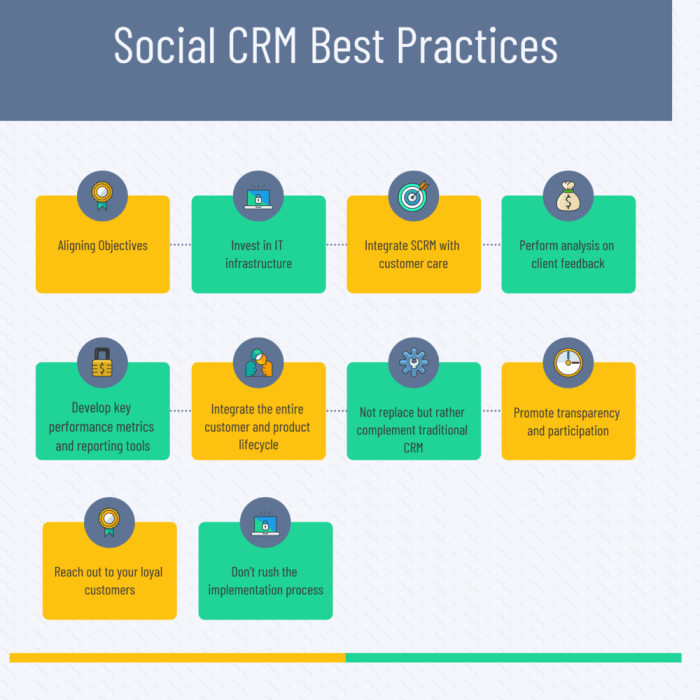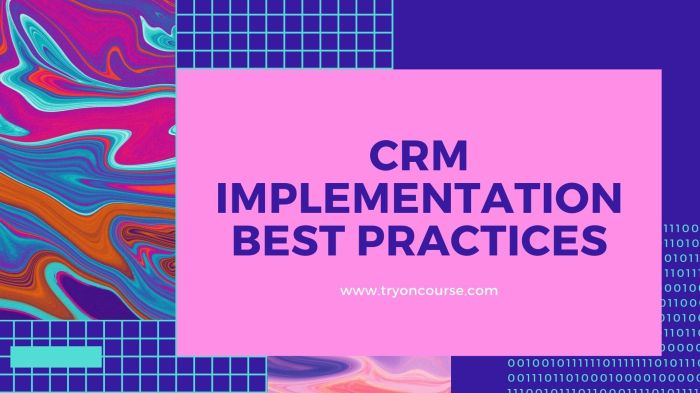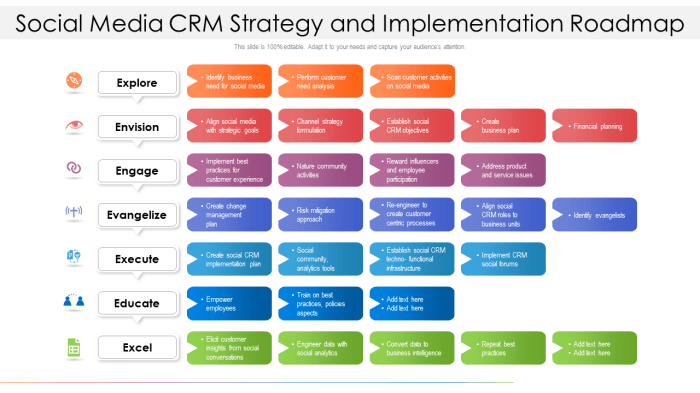Introduction to Social CRM
Social CRM: Best Practices for Implementation – Social CRM (SCRM) is a customer relationship management (CRM) strategy that integrates social media and other online channels into traditional CRM systems. It allows businesses to monitor, engage with, and track customer interactions across multiple social media platforms and other online touchpoints.
In today’s digital world, customers are increasingly using social media to connect with businesses, share their experiences, and seek support. SCRM enables businesses to tap into these conversations and build stronger relationships with their customers.
Benefits of Implementing a Social CRM Strategy
- Improved customer service: SCRM allows businesses to respond to customer inquiries and complaints quickly and efficiently across multiple channels.
- Enhanced customer engagement: SCRM helps businesses engage with customers on a more personal level, building stronger relationships and fostering loyalty.
- Increased sales opportunities: SCRM can help businesses identify potential customers and leads through social listening and targeted advertising.
- Improved brand reputation: SCRM allows businesses to monitor their brand reputation and respond to negative feedback quickly and effectively.
- Better data insights: SCRM provides businesses with valuable data and insights into customer behavior, preferences, and sentiment.
Best Practices for Social CRM Implementation
To effectively implement a Social CRM strategy, follow these steps:
- Define your goals and objectives:Determine what you want to achieve with Social CRM, such as improving customer satisfaction or increasing sales.
- Choose the right tools:Select Social CRM software that aligns with your goals and integrates with your existing systems.
- Create a social media strategy:Develop a plan for how you will use social media to engage with customers, build relationships, and drive business outcomes.
- Train your team:Ensure your team is trained on how to use the Social CRM tools and social media effectively.
- Monitor and measure your results:Track key metrics to measure the success of your Social CRM efforts and make adjustments as needed.
Case Studies of Successful Social CRM Implementations
- Dell:Dell used Social CRM to improve customer service and increase sales by 10%.
- Starbucks:Starbucks used Social CRM to build a loyal customer base and increase brand awareness.
- Adidas:Adidas used Social CRM to engage with customers and launch new products successfully.
Social Media Listening and Monitoring: Social CRM: Best Practices For Implementation

Social media listening and monitoring are crucial for Social CRM as they enable businesses to gather valuable insights into customer sentiment, preferences, and pain points. By actively tracking and analyzing social media conversations, businesses can identify relevant discussions, engage with customers, and proactively address issues.
Best Practices for Social Media Listening and Monitoring
Effective social media listening and monitoring require a strategic approach. Here are some best practices to consider:
- Define clear objectives:Determine the specific goals you want to achieve through social media listening and monitoring, such as improving customer service, generating leads, or enhancing brand reputation.
- Identify relevant s and hashtags:Use relevant s and hashtags to track conversations related to your brand, products, industry, and competitors.
- Use social media monitoring tools:Leverage social media monitoring tools to automate the process of tracking and analyzing social media conversations. These tools can provide real-time alerts, sentiment analysis, and comprehensive reporting.
- Engage with relevant conversations:Actively participate in relevant conversations by responding to comments, answering questions, and providing support. This demonstrates that you are listening and care about your customers.
- Measure and refine:Regularly track and analyze the results of your social media listening and monitoring efforts. This will help you identify areas for improvement and optimize your strategy.
Customer Engagement and Relationship Building

Social CRM is a powerful tool for engaging with customers and building relationships. By listening to social media conversations, businesses can identify customer needs and interests, and tailor their marketing and customer service efforts accordingly. Additionally, social CRM can be used to build communities around brands, and to create opportunities for customers to connect with each other.
Here are some examples of how businesses have used Social CRM to improve customer satisfaction:
Case Study: Dell
- Dell has used social CRM to create a community around its brand, called the Dell Community.
- The Dell Community provides a platform for customers to connect with each other and with Dell employees.
- Dell uses the Dell Community to listen to customer feedback and to identify customer needs.
- Dell has used the Dell Community to improve its products and services.
Case Study: Starbucks
- Starbucks has used social CRM to create a loyalty program called My Starbucks Rewards.
- My Starbucks Rewards allows customers to earn points for every purchase they make.
- Customers can redeem their points for free drinks, food, and merchandise.
- Starbucks uses My Starbucks Rewards to track customer purchases and to identify customer preferences.
- Starbucks uses My Starbucks Rewards to send customers personalized offers and promotions.
Social Media Analytics and Reporting
Social media analytics is crucial for evaluating the effectiveness of Social CRM efforts. By tracking and reporting on key metrics, organizations can gain insights into customer behavior, identify areas for improvement, and optimize their strategies.
Key Metrics to Track and Report On
* Reach:The number of people who have seen your social media content.
Engagement
The number of people who have interacted with your social media content, such as by liking, commenting, or sharing it.
Conversion
The number of people who have taken a desired action, such as visiting your website or making a purchase, after seeing your social media content.
Sentiment
The overall tone of the conversations about your brand on social media.
Influencers
The individuals or organizations that have the most impact on the conversations about your brand on social media.
Integration with CRM Systems
Integrating Social CRM with existing CRM systems is crucial for a comprehensive view of customer interactions. It enables businesses to connect social media data with customer profiles, providing a holistic understanding of their behavior and preferences.
Best Practices for Seamless Integration, Social CRM: Best Practices for Implementation
Establish clear objectives
Define the specific goals of the integration, such as improving customer service, increasing sales, or enhancing brand reputation.
Map data fields
Ensure that the data fields in both systems align to facilitate seamless data transfer and avoid duplication.
Use APIs and middleware
Leverage application programming interfaces (APIs) and middleware to facilitate data exchange between the two systems.
Consider data security
Implement robust security measures to protect sensitive customer information shared between the systems.
Monitor and evaluate
Regularly track the integration’s performance and make adjustments as needed to optimize data flow and accuracy.
Social CRM Tools and Technologies

Social CRM tools and technologies empower businesses to manage and track customer interactions across various social media platforms. These tools provide valuable insights into customer behavior, preferences, and feedback, enabling businesses to build stronger relationships with their customers.
Here’s a list of recommended Social CRM tools and technologies:
- SproutSocial:A comprehensive social media management tool that offers features like social listening, scheduling, engagement, and analytics.
- Hootsuite:A popular social media management platform that allows businesses to manage multiple social media accounts from a single dashboard.
- Buffer:A social media scheduling tool that helps businesses plan and schedule their social media content in advance.
- Salesforce Social Studio:A powerful social CRM tool that integrates with Salesforce CRM, providing businesses with a unified view of customer interactions.
- Zoho Social:A comprehensive social media management tool that offers features like social listening, engagement, and analytics, along with CRM integration.
Common Challenges and Solutions
Implementing Social CRM can be a complex undertaking, and there are several common challenges that organizations may encounter. However, with careful planning and execution, these challenges can be overcome.
Some of the most common challenges include:
- Data integration:Integrating social media data with existing CRM systems can be a complex and time-consuming process.
- Data management:Social media data can be vast and unstructured, making it difficult to manage and analyze.
- Resource constraints:Implementing and managing Social CRM can require significant resources, both in terms of time and money.
- Lack of expertise:Many organizations lack the internal expertise to effectively implement and manage Social CRM.
To overcome these challenges, organizations should:
- Invest in data integration tools:There are a number of software tools available that can help organizations integrate social media data with their CRM systems.
- Develop a data management strategy:Organizations should develop a clear strategy for managing social media data, including how it will be collected, stored, and analyzed.
- Allocate sufficient resources:Organizations should allocate sufficient resources to the implementation and management of Social CRM.
- Partner with a vendor:Organizations may consider partnering with a vendor that can provide expertise and support in implementing and managing Social CRM.
Question & Answer Hub
What are the key benefits of implementing Social CRM?
Improved customer satisfaction, enhanced brand reputation, increased lead generation, and deeper customer insights.
How can I measure the effectiveness of my Social CRM efforts?
Use social media analytics to track key metrics such as engagement, reach, and conversion rates.
What are common challenges in Social CRM implementation?
Data overload, resource constraints, and lack of integration with existing CRM systems.